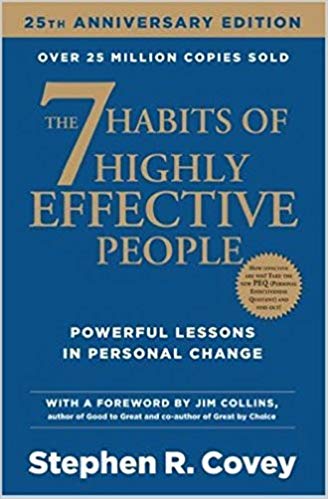

This article is an excerpt from the Shortform summary of "The 7 Habits of Highly Effective People" by Stephen Covey. Shortform has the world's best summaries of books you should be reading.
Like this article? Sign up for a free trial here .
Do you want to make your life better? Are you struggling in your personal or professional life, your interactions with other people, your life balance, or your life’s purpose? What are the 7 habits of highly effective people?
The 7 habits of highly effective people is a set of rules to follow that will shift your paradigm, teach you how to make decisions, and help you achieve your goals. Read on to find out about the 7 habits of highly effective people, and how they can work at making you highly effective, and help you recognize other highly successful people!
What Are the 7 Habits of Highly Effective People?
The 7 Habits of Highly Effective People by Stephen Covey provides an inside-out approach to improving yourself and your life. This method entails examining and adjusting your character, your motives, and how you see the world in order to change how you behave and how you interact with others- some of those people may also be highly successful people! But what are the 7 habits of highly effective people? And what are the 7 habits in order?
- Habits 1-3 develop independence through “Private Victories.” This stage focuses on internal growth and personal character.
- Habits 4-6 build on your independence to develop interdependence through collaboration, cooperation, and communication. These are “Public Victories” that improve your interactions with others.
- Habit 7 teaches you to renew and deepen your habits to continuously improve.
What are the 7 habits in order is an important question. The 7 habits of highly effective people are designed to build from the foundation up — or the inside out — to establish a mindset, habits, and skills that help you identify and achieve the things that are most important to you. You don’t need to perfect each habit before moving onto the next; as you progress and grow, you will naturally continue to improve in all the previous habits.
This is not a quick-fix program that you work through once and move on. Building effective habits takes time, and is an ongoing process of personal growth and change.
Habit 1: Be Proactive
Develop a proactive paradigm. In every situation, you have the choice of being reactive or proactive. If you’re reactive, you let your habits and conditioning dictate how you respond to the people and circumstances around you; if you’re proactive, you decide how you’ll respond to create the results you want. Be proactive requires you to take responsibility for your actions and their consequences, but it also empowers you to take hold of your life and make significant changes to your mindset and behavior. Being proactive is an effective habit that will help you work through the other habits. It will also help guide your answers to the question, what are the 7 habits of highly effective people?
Habit 2: Begin With the End in Mind
When you’re learning and asking what are the 7 habits of highly effective people, you’ll quickly come to habit 2: begin with the end in mind. Never lose sight of your long-term goals and values. To achieve the life you want, create a personal mission statement to identify the big picture — the life you want to lead, the character traits you want to embody, the impact you want to have on those around you. This document serves as a reminder of your ultimate goals and helps you ensure each short-term pursuit and daily action is in line with what’s most important to you.
Habit 3: Put First Things First
You’re probably still wondering what are the 7 habits effective people, and how do they work? The first two focus on a sense of self, but Habit 3 zooms in to daily and weekly time management, so that you stay focused on your goals and values despite any demands and curveballs life throws at you. To effectively manage your time and improve your life, you must develop a keen sense of what’s truly important — what aligns with your personal mission statement — and prioritize time for those tasks, even when it means saying “no” to appealing but unimportant activities.
Habit 4: Think Win/Win
What are the 7 habits of highly effective people, and how do they work? The 7 Habits of highly effective people all aim to help you reach interdependence, which allows you to reach your full potential by knowing how to work effectively with other people to achieve more than you could on your own. To that end, Habit 4 explains how to approach conflicts and negotiations with a Win/Win paradigm that aims to find a mutually beneficial solution, where everyone is happy with the decision and committed to the plan. People with the Win/Win frame of mind value cooperation over competition and believe that there is plenty — of money, success, happiness, and good fortune — to go around.
Habit 5: Listen and Understand the Other First
Habit 5 tackles how to have an effective interaction with someone: First work on understanding the other person’s perspective, and only then help her to understand your perspective. This approach requires empathic listening, where you’re listening with the intent to truly understand the other person’s perspectives and concerns. Only then can you determine the kind of mutually beneficial solution that a Win/Win paradigm strives to achieve.
Habit 6: Create Synergies
Habit 6 is the major achievement of independent relationships: the ability to create synergy with another person. Synergy means that two people working together can create greater results than would have been possible separately. When you ask yourself, what are the 7 habits of highly effective people, you take the first step. Then, you have an understanding of your own paradigms and values, an appreciation of the other person’s perspective, and a genuine desire for Win/Win solutions, you can create synergy to achieve incredible, positive changes in your life that get you closer to reaching your personal mission.
Habit 7: Practice Self-Renewal to Keep Yourself Sharp
Habit 7 is the habit of self-renewal, which maintains and improves the quality of all the other habits. You’re the instrument of your life and performance, and taking care of yourself physically, spiritually, mentally, and socially/emotionally makes you most effective at creating positive change. Just like you have to do maintenance on your car to keep it running at peak capacity, you need to take care of yourself to continue functioning at your best. So what are the 7 habits of highly effective people, and what can you do to make sure you follow them? Highly successful people practice self-renewal, since also improves how efficiently and effectively you’re able to practice the other habits, nurturing and strengthening your conscience, which helps you stay disciplined and focused on your personal growth as you work through the 7 habits of highly effective people.
You’ve already answered two important questions about the 7 habits of highly effective people: what are the 7 habits of highly effective people, and what are the 7 habits in order? The 7 habits of highly effective people will not only help you create effective habits, but will help you achieve a greater sense of self-worth, better ability to work productively with others, and a sense of peace and satisfaction in knowing that you’re putting your time and energy toward the things that matter most to you. The 7 Habits of Highly Effective People is designed to be a guide for repeated reference as you continually grow and improve through the 7 Habits of highly effective people.
———End of Preview———

Like what you just read? Read the rest of the world's best summary of "The 7 Habits of Highly Effective People" at Shortform . Learn the book's critical concepts in 20 minutes or less .
Here's what you'll find in our full The 7 Habits of Highly Effective People summary :
- How to prioritize the hundred tasks you have to focus on the one or two that really matter
- The right way to resolve every disagreement and argument
- How to avoid burning out and succeed over 20+ years






